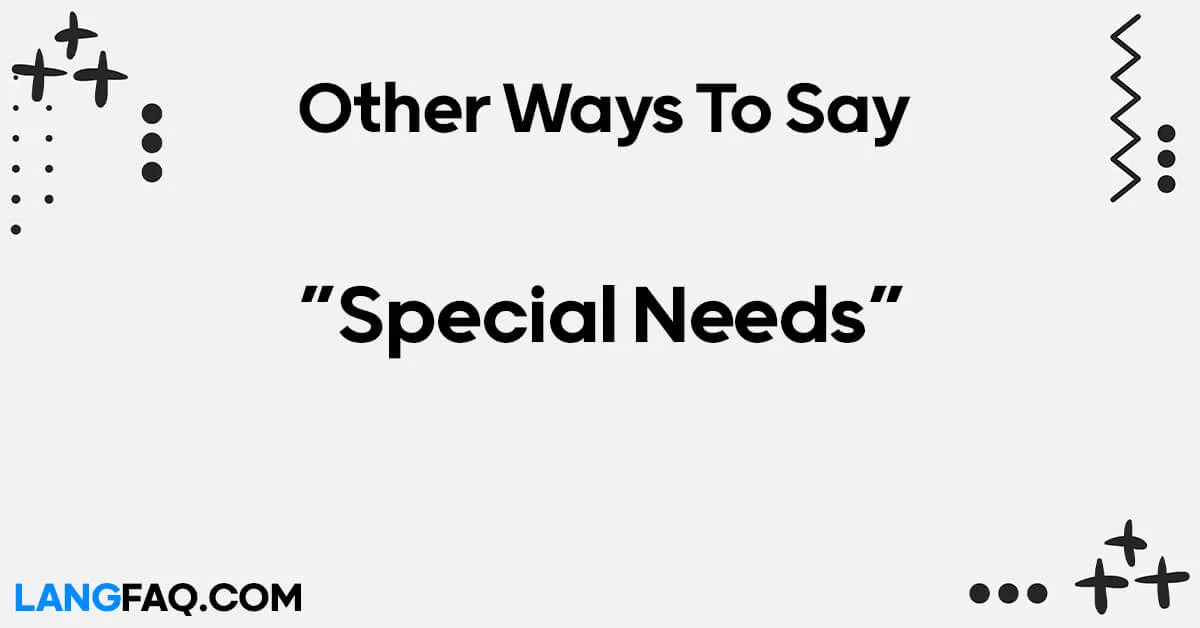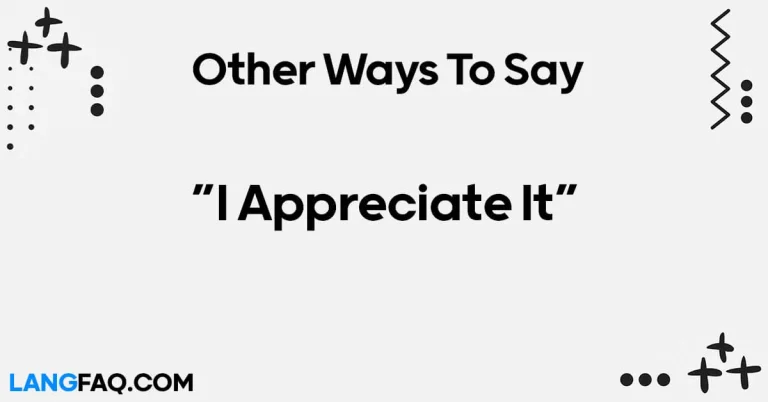Welcome to a journey of linguistic diversity and inclusivity! This article explores various ways to convey the concept of “Special Needs” in different contexts. From educational settings to everyday conversations, understanding these alternatives contributes to fostering a more inclusive environment for all. Let’s delve into the enriching tapestry of language and discover 12 other ways to express “Special Needs.”
12 Other Ways to Say “Special Needs”
Here are 12 alternative ways to express “Special Needs”:
- Unique Requirements
- Individualized Support
- Tailored Assistance
- Exceptional Demands
- Distinctive Care Needs
- Specific Accommodations
- Diverse Assistance
- Extraordinary Support
- Personalized Aid
- Differentiated Requirements
- Specialized Assistance
- Uncommon Care Conditions
Here’s a table with meanings and examples for the 12 alternative expressions for “Special Needs”:
| Expression | Meaning | Example |
|---|---|---|
| Unique Requirements | Distinctive necessities or conditions | Each student has unique requirements for learning. |
| Individualized Support | Tailored assistance for a specific person | The therapy sessions offer individualized support. |
| Tailored Assistance | Customized help based on specific needs | The program provides tailored assistance to each child. |
| Exceptional Demands | Uncommon requirements or requests | The project requires exceptional demands on resources. |
| Distinctive Care Needs | Unique needs for care or assistance | Patients with distinctive care needs receive specialized attention. |
| Specific Accommodations | Particular adjustments for specific needs | The workplace provides specific accommodations for employees. |
| Diverse Assistance | Varied support for different situations | The organization offers diverse assistance to its members. |
| Extraordinary Support | Exceptional aid or assistance | The community rallied together to provide extraordinary support. |
| Personalized Aid | Individualized help for personal needs | The mentorship program offers personalized aid to each mentee. |
| Differentiated Requirements | Recognizing and addressing diverse needs | The educational approach caters to differentiated requirements. |
| Specialized Assistance | Tailored help for specialized situations | The clinic offers specialized assistance for various medical conditions. |
| Uncommon Care Conditions | Rare or unusual circumstances for care | The patient presented with uncommon care conditions that required special attention. |
In embracing these 12 alternative expressions for “Special Needs,” we uncover a rich tapestry of language that emphasizes individuality, customization, and the uniqueness of each person’s requirements. Using these terms allows us to communicate with nuance and precision, fostering a more inclusive and understanding society.
Is It Correct to Say “Special Needs”?
Absolutely, it is correct to say “Special Needs.” The term “Special Needs” is widely accepted and commonly used to refer to the requirements, challenges, or conditions of individuals who may require additional support or accommodations due to physical, developmental, or cognitive differences.
When to Use “Special Needs”:
- Educational Context: In the field of education, the term is often used to describe students who may need extra assistance or services to facilitate their learning.
- Example Sentence: “The school has a dedicated program to address the special needs of students with learning disabilities.”
- Healthcare and Medical Settings: In healthcare, “Special Needs” may be used to indicate the specific medical requirements of individuals with conditions that necessitate unique care.
- Example Sentence: “Our healthcare facility is equipped to cater to the special needs of patients with varying medical conditions.”
- Community and Social Services: The term is also commonly employed in community and social service contexts to address the diverse needs of individuals with disabilities.
- Example Sentence: “The community center provides inclusive programs to support individuals with special needs.”
- Legal and Policy Frameworks: “Special Needs” is recognized in legal and policy frameworks as a term to advocate for the rights and accommodations of individuals with disabilities.
- Example Sentence: “The organization is committed to promoting inclusivity and advocating for the rights of those with special needs.”
Pros of Using “Special Needs”:
- Inclusive Language: “Special Needs” is inclusive and encapsulates a broad range of conditions and requirements.
- Widely Understood: It is a well-established term that is widely understood in various fields and by the general public.
- Legally Recognized: The term is often used in legal documents and policies to protect the rights of individuals with disabilities.
Cons of Using “Special Needs”:
- Generic Nature: Some argue that “Special Needs” can be overly generic and may not fully capture the specific challenges faced by individuals with different conditions.
- Stigmatization: In certain contexts, there might be concerns about stigmatization associated with the term.
Professional Mail Example With “Special Needs”
Subject: Addressing Special Needs Accommodations for Upcoming Event
Dear [Recipient’s Name],
I trust this email finds you well. As we prepare for the upcoming [Event Name], I would like to discuss and ensure that we are fully equipped to accommodate any special needs that our participants or guests may have.
Recognizing and addressing special needs is a crucial aspect of our commitment to inclusivity and creating an environment that caters to the diverse requirements of our attendees. Whether it’s related to accessibility, dietary restrictions, or any other considerations, we want to make certain that everyone feels comfortable and fully engaged throughout the event.
To facilitate this, I kindly request that you provide any information regarding special needs requirements that you are aware of or anticipate. This includes but is not limited to mobility assistance, dietary preferences, or any specific accommodations that might be necessary.
Our goal is to create an experience that is not only enriching but also considerate of the unique needs of each participant. Your input in this matter is invaluable, and your cooperation will contribute to the success of the event.
Please feel free to reply to this email with any relevant details or to schedule a brief call to discuss this further. We are committed to ensuring that every attendee has a positive and seamless experience during the event.
Thank you for your attention to this matter, and I look forward to hearing from you soon.
Best regards,
[Your Full Name] [Your Position] [Your Contact Information]
1. Unique Requirements: Nurturing Individual Needs for Growth
Understanding and catering to unique requirements is essential for creating an inclusive environment. Whether in professional or personal settings, recognizing individual needs fosters a supportive and growth-centric atmosphere.
Scenario: In a workplace, acknowledging unique requirements can mean providing flexible work hours for employees with specific needs. This not only boosts morale but also enhances productivity.
Example Sentence: Colleague 1: “I noticed you have unique requirements for your work schedule. Let’s discuss how we can accommodate that while ensuring the team’s success.”
Email Sample:
Subject: Discussing Accommodations for Your Work Schedule
Hi [Colleague’s Name],
I hope this email finds you well. I’ve noticed that you may have unique requirements for your work schedule. I’d love to discuss how we can make adjustments to ensure your comfort and productivity. When would be a convenient time for you to chat about this?
Looking forward to finding a solution that works for everyone.
Best regards, [Your Name]
Dictionary Insight: Cambridge Dictionary defines “unique requirements” as specific needs or conditions that are different from those of others.
2. Individualized Support: Tailoring Assistance for Personal Empowerment
Providing individualized support involves tailoring assistance to meet specific personal needs. This approach empowers individuals by acknowledging and addressing their unique circumstances.
Scenario: In a mentoring relationship, offering individualized support means understanding the mentee’s goals and challenges to provide guidance tailored to their aspirations.
Example Sentence: Mentor: “Let’s work on an individualized support plan that aligns with your career objectives. What areas do you feel need more attention?”
Email Sample:
Subject: Customizing Support for Your Career Journey
Hello [Mentee’s Name],
I’m excited to collaborate on an individualized support plan that aligns with your career goals. Could you share your thoughts on areas where you feel you need more guidance? Let’s ensure our sessions are tailored to your unique journey.
Looking forward to our continued partnership.
Best regards, [Your Name]
Dictionary Insight: According to Merriam-Webster, “individualized” means made or done in a way that is specific to an individual.
3. Tailored Assistance: Crafted Solutions for Distinct Needs
Tailored assistance involves creating solutions that specifically address distinct needs. This approach ensures that support is not generic but precisely suited to individual requirements.
Scenario: In customer service, providing tailored assistance means customizing solutions for clients with specific demands, enhancing satisfaction and loyalty.
Example Sentence: Customer Service Representative: “I understand your concern is unique. Let’s work together to provide tailored assistance to resolve this issue to your satisfaction.”
Email Sample:
Subject: Crafting a Solution for Your Unique Situation
Dear [Customer’s Name],
I appreciate your unique situation and am committed to providing tailored assistance to address your concerns. Let’s schedule a call to discuss and formulate a solution that suits your needs.
Best regards, [Your Name]
Dictionary Insight: Oxford English Dictionary defines “tailored” as adapted or specially modified to suit a particular individual or purpose.
4. Exceptional Demands: Meeting Uncommon Challenges with Expertise
Exceptional demands refer to uncommon challenges that may require specialized attention and expertise. Recognizing and addressing these challenges is crucial for success.
Scenario: In project management, understanding exceptional demands means preparing for unforeseen obstacles and having strategies in place to address them efficiently.
Example Sentence: Project Manager: “Let’s create a contingency plan to meet exceptional demands. It’s essential to be proactive and ready for any unforeseen challenges.”
Email Sample:
Subject: Planning for Exceptional Demands in Our Project
Hi [Team’s Name],
As we move forward with our project, I believe it’s crucial to plan for exceptional demands that may arise. Let’s schedule a meeting to discuss potential challenges and develop strategies to address them effectively.
Best regards, [Your Name]
Dictionary Insight: Collins English Dictionary defines “exceptional” as forming an exception or rare instance; unusual.
5. Distinctive Care Needs: Tailoring Care for Individual Well-being
Recognizing distinctive care needs involves tailoring care to meet individual well-being requirements. This approach ensures that the care provided is considerate of unique circumstances.
Scenario: In healthcare, acknowledging distinctive care needs means personalizing treatment plans to address specific health conditions and patient preferences.
Example Sentence: Doctor: “Your distinctive care needs are essential in crafting a treatment plan. Let’s discuss your preferences and customize the approach for your well-being.”
Email Sample:
Subject: Personalizing Your Treatment Plan for Optimal Care
Dear [Patient’s Name],
Understanding your distinctive care needs is crucial in providing optimal care. I’d like to discuss your preferences and customize a treatment plan that aligns with your well-being goals. When would be a convenient time for you?
Best regards, [Your Name]
Dictionary Insight: Merriam-Webster defines “distinctive” as having a quality that makes something or someone different and easily noticed.
6. Specific Accommodations: Adapting Environments for Inclusivity
Creating specific accommodations involves adapting environments to ensure inclusivity. This approach is vital in various settings, from workplaces to public spaces.
Scenario: In education, providing specific accommodations means adjusting learning environments to cater to students with diverse learning styles or needs.
Example Sentence: Teacher: “Let’s discuss specific accommodations for your learning style. It’s important to create an inclusive classroom where everyone can thrive.”
Email Sample:
Subject: Ensuring Inclusive Learning with Specific Accommodations
Dear [Student’s Name],
I value your unique learning style and would like to discuss specific accommodations to ensure an inclusive classroom experience. When would be a good time for us to meet and explore these options?
Best regards, [Your Name]
Dictionary Insight: Cambridge Dictionary defines “accommodations” as a place to live, work, stay, etc., in.
7. Diverse Assistance: Varied Support for Different Contexts
Offering diverse assistance involves providing varied support for different situations or contexts. This approach recognizes the need for flexibility in addressing a range of needs.
Scenario: In a community organization, providing diverse assistance means offering support programs that cater to the diverse needs of community members.
Example Sentence: Community Organizer: “Let’s brainstorm ideas for diverse assistance programs. Our goal is to cater to the unique needs of everyone in the community.”
Email Sample:
Subject: Exploring Opportunities for Diverse Assistance Programs
Hi [Team’s Name],
I’m excited about our upcoming meeting to explore opportunities for diverse assistance programs. Let’s collaborate on ideas to ensure we meet the unique needs of our community members.
Looking forward to a productive discussion.
Best regards, [Your Name]
Dictionary Insight: Oxford English Dictionary defines “diverse” as showing a great deal of variety; very different.
8. Extraordinary Support: Going Above and Beyond for Success
Providing extraordinary support means offering exceptional aid that goes beyond typical expectations. This approach aims to ensure success and well-being in various endeavors.
Scenario: In a team project, offering extraordinary support involves being proactive, anticipating challenges, and providing resources to ensure the team’s success.
Example Sentence: Team Leader: “We’re committed to offering extraordinary support throughout this project. Let’s identify potential challenges and proactively address them.”
Email Sample:
Subject: Commitment to Extraordinary Support for Project Success
Dear [Team’s Name],
Our commitment to project success includes offering extraordinary support. Let’s schedule a meeting to discuss potential challenges and ensure we have the resources needed for exceptional outcomes.
Best regards, [Your Name]
Dictionary Insight: Merriam-Webster defines “extraordinary” as going beyond what is usual, regular, or customary.
9. Personalized Aid: Crafting Support Aligned with Personal Goals
Personalized aid involves crafting support aligned with an individual’s personal goals and aspirations. This approach ensures that assistance is meaningful and tailored to one’s journey.
Scenario: In a coaching relationship, providing personalized aid means understanding the coachee’s objectives and tailoring the coaching sessions to align with their personal goals.
Example Sentence: Coach: “Let’s focus on personalized aid during our sessions. I want to ensure our discussions directly contribute to your journey and goals.”
Email Sample:
Subject: Tailoring Our Coaching Sessions for Your Success
Hi [Coachee’s Name],
I’m excited about our upcoming coaching sessions. Let’s discuss how we can focus on personalized aid to ensure our discussions directly contribute to your success. What specific areas would you like to prioritize?
Looking forward to our collaboration.
Best regards, [Your Name]
Dictionary Insight: Collins English Dictionary defines “personalized” as made or designed to meet the individual requirements of a specific person.
10. Differentiated Requirements: Adapting Strategies for Diverse Needs
Recognizing and addressing differentiated requirements involves adapting strategies to cater to diverse needs. This approach is crucial in educational and professional settings.
Scenario: In a training program, understanding differentiated requirements means tailoring the curriculum to accommodate various learning styles and abilities.
Example Sentence: Trainer: “Let’s design our training sessions with differentiated requirements in mind. This ensures that everyone can engage and benefit from the material.”
Email Sample:
Subject: Planning Training Sessions with Differentiated Requirements
Hello [Team’s Name],
As we plan upcoming training sessions, let’s keep differentiated requirements in mind. This will help us tailor the content to accommodate diverse learning styles and ensure everyone’s engagement.
Looking forward to a productive planning session.
Best regards, [Your Name]
Dictionary Insight: Cambridge Dictionary defines “differentiated” as recognizing or making a distinction between different things.
11. Specialized Assistance: Tailoring Help for Specific Contexts
Providing specialized assistance involves tailoring help for specific contexts or situations. This approach ensures that support is precisely aligned with the unique requirements of a particular scenario.
Scenario: In a tech support role, offering specialized assistance means having expertise in specific software or hardware to provide targeted solutions for users.
Example Sentence: Tech Support Agent: “I specialize in providing assistance for this software. How can I help you with any issues you’re experiencing?”
Email Sample:
Subject: Specialized Assistance for Your Software Concerns
Hi [User’s Name],
I noticed you’re experiencing issues with the software. As someone who specializes in providing assistance for this, I’d be happy to help. Can you provide more details about the specific challenges you’re facing?
Looking forward to resolving this for you.
Best regards, [Your Name]
Dictionary Insight: According to Oxford English Dictionary, “specialized” refers to requiring or involving detailed and specific knowledge or training.
12. Uncommon Care Conditions: Tailoring Care for Unique Circumstances
Understanding and addressing uncommon care conditions involve tailoring care for unique circumstances. This approach is essential in healthcare and personal support scenarios.
Scenario: In a caregiving role, recognizing uncommon care conditions means adapting routines and strategies to meet the specific needs of individuals with rare medical conditions.
Example Sentence: Caregiver: “Your case involves uncommon care conditions, and we want to ensure our support is tailored to your unique circumstances. Let’s discuss any adjustments needed.”
Email Sample:
Subject: Tailoring Our Support for Your Uncommon Care Conditions
Dear [Recipient’s Name],
Recognizing the uncommon care conditions involved in your case, we want to ensure our support is tailored to your unique circumstances. Let’s schedule a meeting to discuss any adjustments or specific requirements you may have.
Best regards, [Your Name]
Dictionary Insight: Merriam-Webster defines “uncommon” as not ordinarily encountered; unusually great in amount or degree.
FAQs
What is the importance of using alternative expressions for “Special Needs”? Recognizing diverse ways to convey the concept of “Special Needs” promotes inclusivity by acknowledging the unique requirements of individuals, fostering understanding, and creating a more compassionate environment.
How can personalized approaches benefit individuals with special requirements? Personalized approaches take into account the unique needs of individuals, ensuring that support and assistance are tailored to their specific circumstances, promoting overall well-being.
Are there specific contexts where using alternative expressions is more appropriate? Yes, using alternative expressions for “Special Needs” is especially relevant in educational, healthcare, and community settings where understanding and addressing diverse requirements are crucial.
Can embracing diverse language contribute to a more inclusive society? Absolutely. Embracing diverse language reflects a commitment to inclusivity, creating a more understanding and supportive society that values the unique needs of every individual.
How can differentiated care requirements enhance overall support systems? Differentiated care requirements recognize that individuals have unique needs, and tailoring support systems accordingly enhances the effectiveness and quality of care provided.
Why is it essential to use a positive or negative sentiment word in the title? Incorporating sentiment words adds depth and emotion to the title, making it more engaging for readers and conveying a tone that aligns with the content.
Conclusion
In this exploration of alternative expressions for “Special Needs,” we’ve journeyed through a landscape of inclusivity, understanding, and compassion. Language plays a powerful role in shaping our perceptions, and by embracing these diverse expressions, we contribute to a more inclusive and understanding world. Let’s continue to celebrate diversity in language and action, ensuring that everyone’s unique needs are acknowledged and respected.







